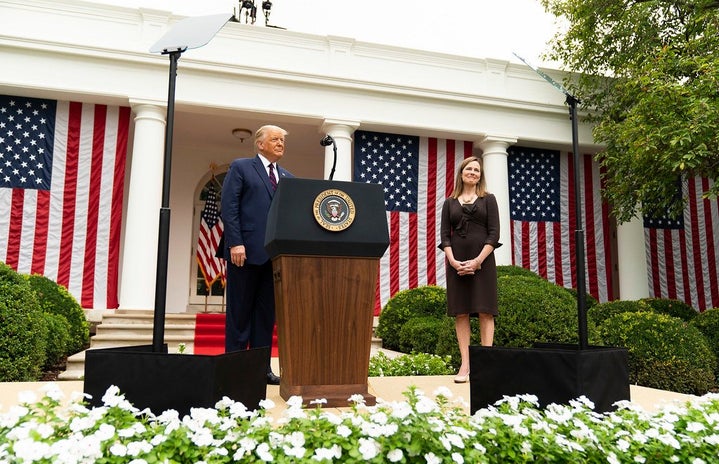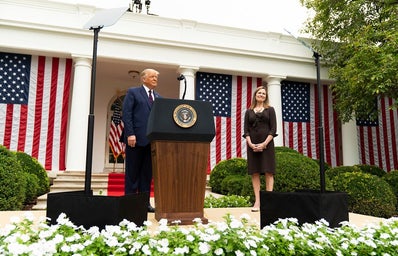Who is our new Supreme Court Justice?
As of October 26, 2020, Judge Amy Coney Barrett, with a 52-48 vote, has been confirmed to be the 115th Associate Justice of the United States Supreme Court. Judge Barrett is a conservative, shifting the Supreme Court to a 6-3 majority.
What is Amy Barrett’s background?
Barrett was educated in private Catholic institutions throughout her elementary and highschool years. She received a B.A. in English literature from Tennessee Roads College in 1994 and later graduated at the top of her class from Notre Dame Law School in 1997, where she received the Hoynes Prize.
After her collegiate days were over, she was a clerk for two fellow conservatives, Judge Laurence Silberman of the United States Court of Appeals for the District of Columbia Circuit and Justice Antonin Scalia of the United States Supreme Court.
In 1999, she started practicing law in Texas at Miller, Cassidy, Larroca & Lewin. Barrett practiced law here from 1999 to 2001, where she worked on a few cases with the Democratic senators for the 7th Circuit, but never argued any appeals while in this practice.
From 2002 to 2017, she worked as a professor of law at Notre Dame University, her alma mater.
She has been married to Jesse Barrett for 21 years. They met at Notre Dame University, before they both graduated. She has seven kids. Emma, Vivian, Tess, John Peter, Liam, Juliet and Benjamin.
Amy Barrett’s First Statements as Supreme Court Nominee:
On September 26, 2020 Amy Barret stands at the White House and says,
“I am truly humbled by the prospect of serving on the Supreme Court. Should I be confirmed, I will be mindful of who came before me. The flag of the United States is still flying at half-staff in memory of Justice Ruth Bader Ginsburg, to mark the end of a great American life. Justice Ginsburg began her career at a time when women were not welcome in the legal profession. But she not only broke glass ceilings, she smashed them. For that, she has won the admiration of women across the country and, indeed, all over the world.
She was a woman of enormous talent and consequence and her life of public service serves as an example to us all. Particularly poignant to me was her long and deep friendship with Justice Antonin Scalia, my own mentor. Justices Scalia and Ginsburg disagreed fiercely in print without rancor in person. Their ability to maintain a warm and rich friendship despite their differences even inspired an opera. These two great Americans demonstrated that arguments–even about matters of great consequence–need not destroy affection. In both my personal and professional relationships I strive to meet that standard.
I was lucky enough to clerk for Justice Scalia. And given his incalculable influence on my life, I am very moved to have members of the Scalia family here today including his dear wife Maureen. I clerked for Justice Scalia more than 20 years ago, but the lessons I learned still resonate. His judicial philosophy is mine too. A judge must apply the law as written. Judges are not policy makers and they must be resolute in setting aside any policy views they might hold.”
Does Amy Coney Barrett have a conservative, liberal, or originalist view on:
-
Death Penalty? Conservative.
-
Immigration Rights? Conservative.
-
LGBTQ+ Community? Conservative.
-
Racial Justice? Liberal.
-
Roe v. Wade and Abortions? Conservative.
-
Second Amendment Right? Originalist.
-
Sexual Assault on the basis of Title IX? Conservative.
What is Amy Barrett’s stance (in her own words)?
-
Death Penalty:
In “Catholic Judges in Capital Cases” Barrett states,
“ … rejection of the death penalty is most consistent with the example of Jesus, who taught and practiced that we should love our enemies” (Barrett & Garvey 309).
“If the Church rejects the death penalty for murderers already serving life sentences, the more likely explanation would be that it does not work or that there are alternatives (better security before the fact, increased punishments like solitary confinement after the fact) that do” (Barrett & Garvey 312).
“Some say the death penalty should be imposed because gang members who murder deserve it. That argument is foreclosed by Catholic teaching on the subject. Some say we should impose it because that is the only way to deter urban crime. But there is no reason to think that urban criminals are peculiarly susceptible to deterrence. The argument probably works no better here than it does elsewhere” (Barrett & Garvey 312-313).
-
Immigration Rights:
In the 7th Circuit case, Alvarenga-Flores v Jefferson B. Sessions III Barrett states,
“Alvarenga seeks asylum, withholding of removal, and relief under the Convention Against Torture because he fears torture and persecution from gang members if he returns to El Salvador. The immigration judge concluded that Alvarenga lacked credibility and denied him relief. Finding no clear error in the immigration judge’s decision, the Board of Immigration Appeals dismissed the appeal. Substantial evidence supports the decisions of the immigration judge and the Board, and the record does not compel a contrary conclusion. We therefore deny Alvarenga’s petition for review” (Barrett 1-2)
-
LGBTQ+ Community:
During Barrett’s Confirmation Hearing she responds to the question,
Senator Dianne Feinstien asks,
“Do you agree with this particular point of Justice Scalia’s view: that the US constitution does not afford gay people the fundamental right to marry?”
Barrett says,
“Senator Feinstien, as I said to Senator Graham at the outset, if I were confirmed, you would be getting Justice Barrett, not Justice Scalia. And I am sorry to not be able to embrace or disavow Justice Scalia’s position, but I really can’t do that on any point of law.”
“Senator I have no agenda and I do want to be clear that I have never discriminated on the basis of sexual preference and would not ever discriminate on the basis of sexual preference.”
-
Racial Justice:
During Barrett’s Confirmation Hearing she responds a question,
Senator Dick Durban asks,
“Have you seen the George Floyd Video? What impact did it have on you?”
Barrett says,
“Senator as you might imagine, given I have two black children, that was very, very personal for my family. My 17-year-old daughter, Vivian, who is adopted from Haiti, all of this was erupting. It was very difficult for her. We wept together. To understand that there would be a risk to her brother, or the son she might have one day, of that kind of brutality, has been an ongoing conversation.
“I think it is entirely uncontroversial and an obvious statement given, as we just talked about the George Floyd video, that racist persists in our country. Giving broader statements or making broader diagnoses about the problem of racism is kind of beyond what I am capable of doing as a judge.”
-
Roe v. Wade & Abortions:
In a lecture at Jacksonville University Barrett says,
“I don’t think the core case, Roe’s core holding that women have a right to an abortion, I don’t think that would change, but I think the question of whether people can get very late-term abortions, you know, how many restrictions can be put on clinics, I think that will change.”
In “Catholic Judges in Capital Cases” Barrett states,
“The prohibitions against abortion and euthanasia (properly defined) are absolute; those against war and capital punishment are not. There are two evident differences between the cases. First, abortion and euthanasia take away innocent life. This is not always so with war and punishment. Second, in cases of aggression it may be impossible to avoid the taking of life. Sometimes the only way to save the victim is to do what will in fact kill the aggressor” (Barrett & Garvey 307).
In The Washington Post Amy Barrett talks to Senator Amy Klobuchar (D-Minn.);
Barrett says,
“And scholars across the spectrum say that doesn’t mean that Roe should be overruled. But descriptively, it does mean that it’s not a case that everyone has accepted and doesn’t call for its overruling… As Richard Fallon from Harvard said, Roe is not a super-precedent because calls for its overruling have never ceased. But that doesn’t mean that Roe should be overruled; it just means that it doesn’t fall on the small handful of cases like Marbury v. Madison and Brown v. the Board that no one questions anymore.”
-
Second Amendment:
In the 7th Circuit case, Kanter v. Barr, Barrett states,
“History is consistent with common sense: it demonstrates that legislatures have the power to prohibit dangerous people from possessing guns. But that power extends only to people who are dangerous. Founding-era legislatures did not strip felons of the right to bear arms simply because of their status as felons. Nor have the parties introduced any evidence that founding-era legislatures imposed virtue-based restrictions on the right; such restrictions applied to civic rights like voting and jury service, not to individual rights like the right to possess a gun” (Barrett 21).
“In sum, founding-era legislatures categorically disarmed groups whom they judged to be a threat to the public safety. But neither the convention proposals nor historical practice supports a legislative power to categorically disarm felons because of their status as felons” (Barrett 41).
“ … holding that the ban is constitutional as applied to Kanter does not “put the government through its paces,” but instead treats the Second Amendment as a “second-class right, subject to an entirely different body of rules than the other Bill of Rights guarantees” (Barrett 63-64).
-
Sexual Assault on the Basis of Title XI:
In the 7th Circuit case, Doe v. Purdue Barrett states,
“After finding John Doe guilty of sexual violence against Jane Doe, Purdue University suspended him for an academic year and imposed conditions on his readmission. As a result of that decision, John was expelled from the Navy ROTC program, which terminated both his ROTC scholarship and plan to pursue a career in the Navy. 2 No. 17-3565 John sued the university and several of its officials, asserting two basic claims. First, he argued that they had violated the Fourteenth Amendment by using constitutionally flawed procedures to determine his guilt or innocence. Second, he argued that Purdue had violated Title IX by imposing a punishment infected by sex bias. A magistrate judge dismissed John’s suit on the ground that he had failed to state a claim under either theory. We disagree. John has adequately alleged violations of both the Fourteenth Amendment and Title IX” (Barrett 1-2)
“According to John, this letter reveals that Purdue had a financial motive for discriminating against males in sexual assault investigations. To protect its federal funds, John says, the university tilted the process against men accused of sexual assault so that it could elevate the number of punishments imposed. The resulting track record of enforcement would permit Purdue to signal its commitment to cracking down on campus sexual assault, thereby fending off any suggestion that it was not complying with the Department of Education’s directive” (Barrett 26-27).
Sources: Chicago Sun-Times, The Washington Post, SCOTUSblog, White House



